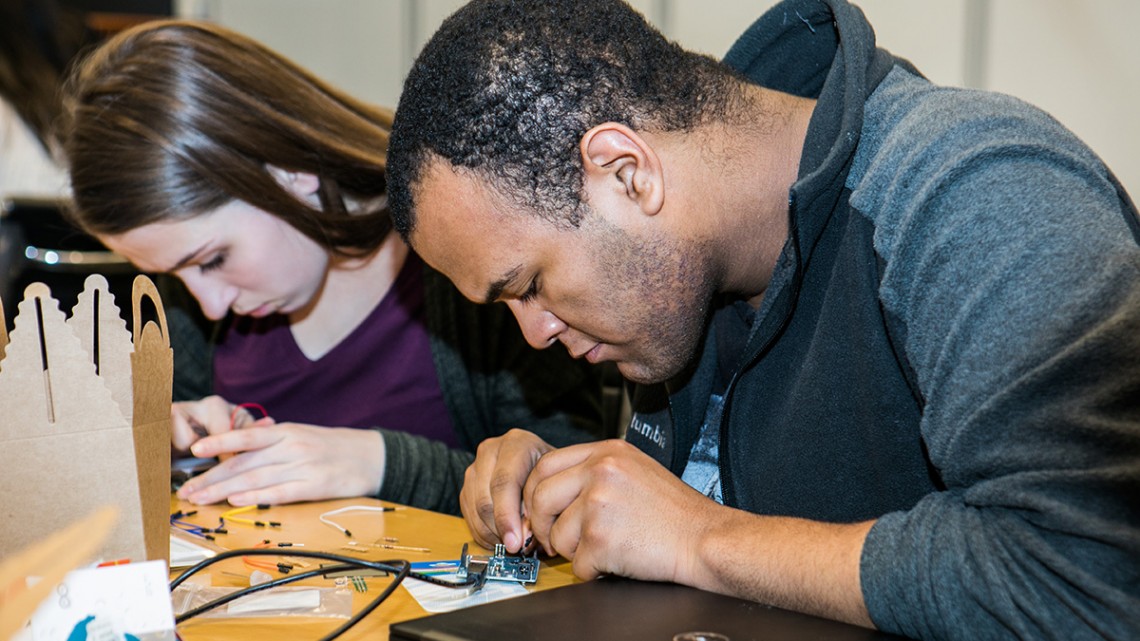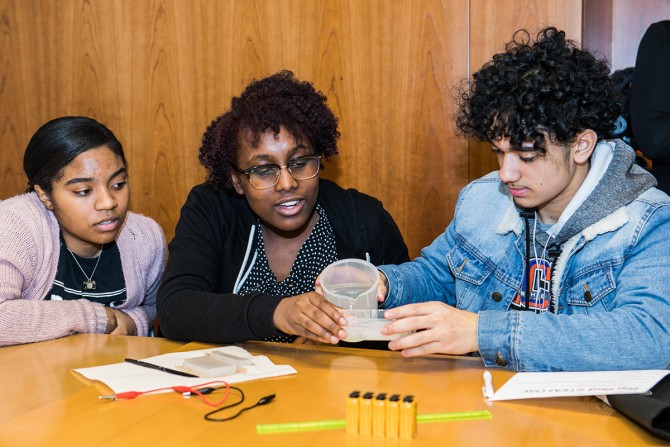
Monika Ryczek and Tony Valencia, students from High School for Environmental Studies in Manhattan, participate in Big Red STEM Day Feb. 27 at Weill Cornell Medicine. Monika and Tony attended a workshop led by graduate students from Cornell Tech in which they programmed technology to act as a personal reminder.
NYC high schoolers explore STEM fields at Weill Cornell Medicine
By Geri Clark
Getting high school students to stay inside on a warm, sunny afternoon to work on science might sound like an impossible task, but on Feb. 27 dozens of students from public high schools across New York City happily did just that.
A total of 90 teens participated in Big Red STEM Day, a Weill Cornell Medicine-led initiative designed to inspire high school students from communities underrepresented in science, technology, engineering and mathematics (STEM) to pursue STEM-related education and careers.
Big Red STEM Day, hosted at Weill Cornell Medicine in Manhattan, is part of a Cornell-wide collaboration with the New York City Department of Education. Doctoral students and representatives from Weill Cornell Medicine, Cornell Tech, the Cornell Center for Materials Research and Cornell Cooperative Extension New York City came armed with hands-on science activities in everything from genetics to coding, in an effort to engage the next generation of scientists.
“We chose a biology-related activity because biotech is going to be important for kids this age,” said Philip Burnham, a doctoral student in biomedical engineering. Along with fellow doctoral student Hao Shi, Burnham led students in a gel electrophoresis activity designed to introduce them to DNA fingerprinting.
“We really hope to inspire them, because this is the future,” Shi said. “They are the ones who are going to do it.”
Each student attended two workshops. Other activities included a lab where students learned about precision medicine and extracted DNA from strawberries under the guidance of Weill Cornell Medicine graduate students; a Cornell Tech activity where participants built and programmed an Arduino-powered microcontroller to work as a health reminder; and a drone discovery workshop run by Cornell Cooperative Extension representatives, where students built and flew their own mini-drones to learn about the principles of flight.
“This is pretty inspiring,” said Roderik Urbaez, a student at Manhattan Academy for Arts and Language, as he scooped DNA he’d extracted from a strawberry out of a cup. “I want to be a pediatric cardiothoracic surgeon, so the chance to do hands-on science like this is amazing and makes me want to do more.”
Ana-Lisa Myers, a student at Hillcrest High School in Queens, built and coded a health-reminder device. “I love seeing how technology can help people,” she said.
That’s exactly the reaction the event’s organizers were looking for.
“Big Red STEM Day hopes to be the spark that many students need in order to see themselves making big discoveries in the future,” said Marcus Lambert, assistant dean of diversity and student life at Weill Cornell Medicine and moderator of a discussion panel at the end of the day. “We hope that this program increases students’ enthusiasm for STEM and helps them to know that they have a place here at Cornell to pursue their ideas.”
The day included plenty of time for students to interact with scientists, culminating in a dinner that featured a dozen Weill Cornell Medicine faculty members. Students had the opportunity to quiz faculty members on the STEM field and how they decided to pursue careers in science and medicine. Faculty gave crucial advice to the teens, who are considering their next steps in their education. That interaction is as critical as the hands-on experiences, said Sasha Ban, senior program manager for the high school science research program of the New York City Department of Education.
“This is not an event where kids are talked down to,” she said. “We want them to build a comfort level with scientists, to see that scientists are people just like them.”
The formal event wrapped up with a keynote and panel discussion that provided some face-to-face time. Panelists – graduate and undergraduate students at Cornell, Cornell Tech and Weill Cornell Medicine – spoke about their work, answered questions and gave advice about science and life to the high school students.
In his keynote speech, Dr. Augustine M.K. Choi, the Stephen and Suzanne Weiss Dean of Weill Cornell Medicine, reminded students that scientists have a responsibility to help them succeed, and that Weill Cornell scientists are especially dedicated to this.
“It’s on us to make mentorship a priority,” Choi said. “It’s our job to help you.”
The students’ job, Choi said, is to stay inspired: “You will face obstacles; everyone does. But believe in yourself and don’t let any barriers limit you.”
Geri Clark is a freelance writer for Weill Cornell Medicine.
Media Contact
Get Cornell news delivered right to your inbox.
Subscribe

